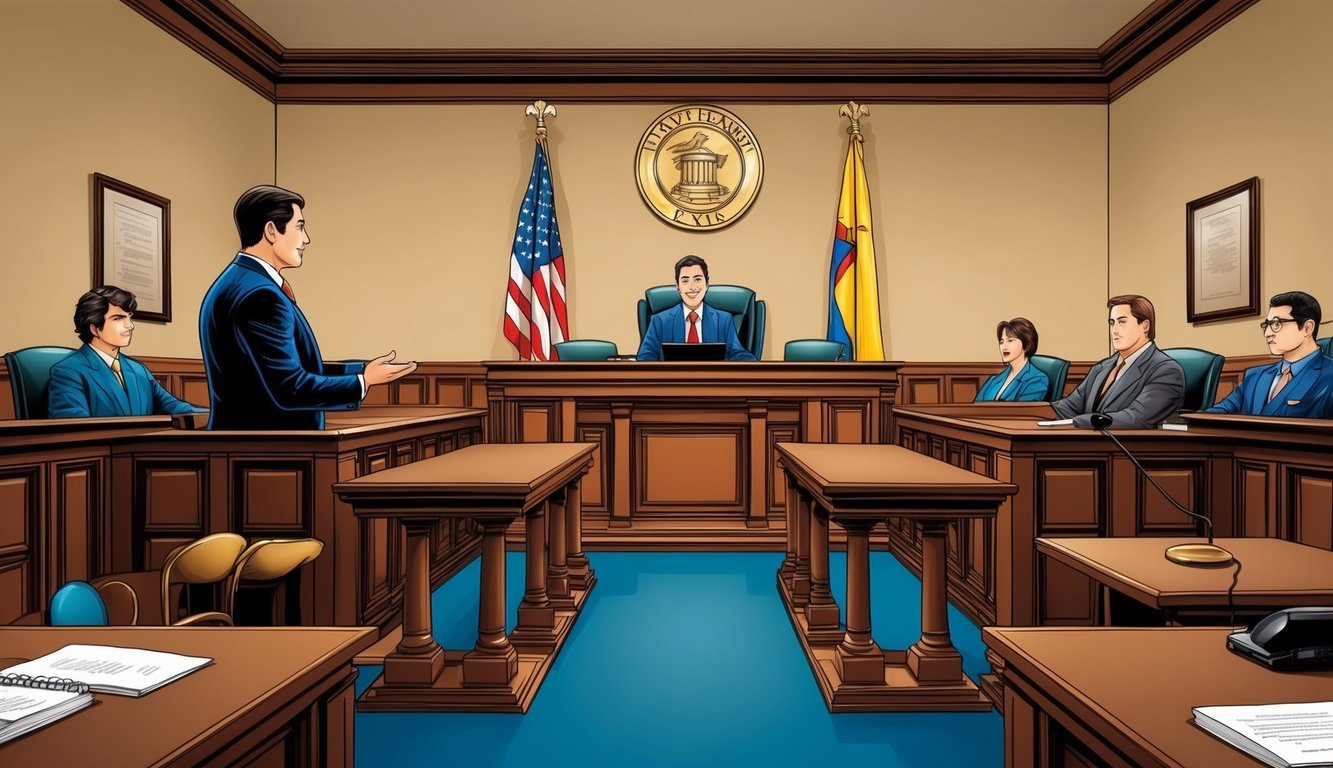Dealing with legal disputes against companies can be challenging and stressful. When you find yourself in a situation where you need to take legal action against a business in Phoenix, you need the right legal representation on your side.
Choosing the best lawyer to sue a company in Phoenix requires careful consideration of several factors. You should look for an attorney with extensive experience in business litigation, a proven track record of success, and a deep understanding of Arizona’s legal landscape. The right legal professional can significantly impact the outcome of your case and help protect your interests throughout the legal process.
1) David L. Wallin, Esq.

David M. Wallin is a highly experienced attorney based in Palmdale, California. While he primarily focuses on criminal defense, his expertise in legal matters may be valuable for your case against a company.
Wallin has over three decades of legal experience and has earned the distinction of being a certified criminal law specialist. This title is held by only about 180 attorneys in the entire state of California.
Wallin’s law firm is committed to providing cost-effective legal representation. You’ll appreciate their competitive rates for legal services, which can be crucial when considering a lawsuit against a company.
Throughout his career, Wallin has handled hundreds of cases across various legal areas. This extensive experience could be beneficial in understanding the intricacies of your case against a company.
While Wallin’s primary focus is criminal defense, his broad legal knowledge and dedication to helping clients may make him a strong advocate for your case. You’ll find that his firm is committed to providing the best possible legal representation for their clients.
It’s worth noting that Wallin’s office is open 24 hours a day, seven days a week. This accessibility could be advantageous when you need urgent legal advice or assistance with your case.
Understanding Legal Grounds for Suing a Company
When pursuing legal action against a company, it’s crucial to identify the specific grounds for your lawsuit. Common reasons for suing a business include contract violations, workplace issues, and defective products.
Breach of Contract
A breach of contract occurs when a company fails to fulfill its contractual obligations. This can include:
- Failure to deliver goods or services
- Non-payment for products or work completed
- Violating confidentiality agreements
To prove a breach of contract, you’ll need to demonstrate:
- A valid contract existed
- You fulfilled your part of the agreement
- The company failed to meet its obligations
- You suffered damages as a result
Keep all relevant documents, including the original contract, communications, and evidence of damages. These will be crucial in building your case.
Employment Disputes
Employment-related lawsuits can arise from various workplace issues. Common grounds include:
- Discrimination based on protected characteristics
- Sexual harassment or a hostile work environment
- Wrongful termination
- Wage and hour violations
Document all incidents thoroughly, including dates, times, and witnesses. Report issues to HR or management as per company policy. If the problem persists, consult an employment lawyer to discuss your options.
Be aware of statutes of limitations for filing employment claims, as they can vary depending on the nature of the dispute.
Product Liability
Product liability cases involve injuries or damages caused by defective products. These lawsuits typically fall into three categories: design defects, manufacturing defects, and failure to warn or inadequate instructions.
To pursue a product liability claim, you must prove:
- The product was defective
- You used the product as intended
- The defect caused your injury or damages
Preserve the defective product if possible. Gather medical records, photos of injuries, and any relevant product documentation. Expert testimony may be necessary to establish the defect and its connection to your injuries.
Key Attributes of the Best Lawyers

The most effective attorneys possess a combination of extensive experience, proven success, and glowing client reviews. These qualities set them apart in handling complex legal matters and achieving favorable outcomes for their clients.
Experience and Expertise
Experienced lawyers demonstrate a deep understanding of the law and its practical applications. You should look for attorneys with years of practice in business litigation and corporate disputes. These professionals have honed their skills through numerous cases, developing a keen eye for legal nuances.
Expertise in specific areas of law is crucial. The best lawyers stay updated on the latest legal developments and precedents. They possess in-depth knowledge of state and federal regulations relevant to your case.
Seek attorneys who have handled cases similar to yours. Their familiarity with industry-specific issues can be invaluable in formulating effective strategies.
Track Record of Success
A lawyer’s past performance is a strong indicator of their capabilities. Look for attorneys with a history of winning cases or negotiating favorable settlements. Review their portfolio of cases, paying attention to outcomes in situations similar to yours.
Consider the complexity of cases they’ve handled successfully. High-stakes litigation experience demonstrates their ability to manage challenging legal scenarios.
Ask about their success rates in court and settlement negotiations. The best lawyers often have impressive win-loss ratios and a reputation for securing substantial settlements.
Client Testimonials
Client feedback provides valuable insights into a lawyer’s performance and client relations. Look for attorneys with consistently positive reviews and high ratings on legal directories.
Pay attention to testimonials that highlight the lawyer’s communication skills, responsiveness, and ability to explain complex legal concepts clearly. The best attorneys keep their clients informed throughout the legal process.
Consider feedback about the lawyer’s negotiation skills and courtroom presence. Clients often comment on how well their attorney represented them in high-pressure situations.
Look for specific examples of how the lawyer went above and beyond for their clients. Exceptional attorneys often receive praise for their dedication and personalized approach to each case.
Navigating the Legal Process in Phoenix

Taking legal action against a company requires careful navigation through several key stages. Each phase presents unique challenges and opportunities as you pursue your case in Phoenix.
Filing a Complaint
To initiate a lawsuit, you must file a complaint with the appropriate court. This document outlines your grievances and the legal basis for your claim. In Phoenix, you’ll likely file with the Maricopa County Superior Court.
Drafting a complaint requires precision and legal expertise. Your attorney will ensure all necessary elements are included:
- Parties involved
- Jurisdiction and venue
- Factual allegations
- Legal claims
- Requested relief
The complaint must be served to the defendant, officially notifying them of the lawsuit. Timing is crucial, as there are strict deadlines for filing and serving complaints.
Discovery Phase
Once the complaint is filed, both parties enter the discovery phase. This crucial stage allows you to gather evidence to support your case. Discovery methods include:
- Interrogatories (written questions)
- Depositions (oral testimonies under oath)
- Requests for documents
- Requests for admissions
Your attorney will guide you through this process, helping you respond to requests and obtain valuable information. They’ll also review the evidence provided by the opposing party.
Discovery can be time-consuming and complex. It’s essential to be thorough and strategic in your approach.
Settlement Negotiations
Many cases are resolved through settlement negotiations before reaching trial. Your attorney will engage with the opposing counsel to explore potential resolutions.
Key aspects of settlement negotiations include:
- Evaluating the strength of your case
- Assessing potential damages
- Considering non-monetary terms
- Weighing the costs and risks of trial
Your lawyer will advise you on settlement offers and help you make informed decisions. Remember, the decision to settle is ultimately yours.
Court Procedures
If a settlement isn’t reached, your case will proceed to trial. Phoenix courts follow specific procedures and rules of evidence. Your attorney will prepare you for what to expect.
Key trial phases include:
- Jury selection (if applicable)
- Opening statements
- Presentation of evidence
- Witness testimonies
- Closing arguments
Throughout the trial, your lawyer will advocate on your behalf, objecting to improper evidence and cross-examining witnesses. They’ll ensure your rights are protected and your case is presented effectively.
Post-trial procedures may include filing appeals if necessary. Your attorney will discuss these options based on the trial outcome.
Frequently Asked Questions

When considering legal action against a company in Phoenix, several key factors come into play. Understanding the qualifications of attorneys, lawsuit processes, fees, and rights is crucial for a successful case.
What are the qualifications to look for in a lawyer for corporate litigation in Phoenix?
You should seek an attorney with extensive experience in corporate litigation. Look for business litigation specialists who have a track record of handling cases similar to yours. Check their educational background, years of practice, and professional associations.
What steps should be taken to initiate a lawsuit against a company in Arizona?
First, gather all relevant documents and evidence. Consult with a qualified attorney to assess your case. They will help you file a complaint in the appropriate court, which is often the Maricopa County Superior Court for Phoenix-based cases.
What are typical legal fees for corporate lawsuit representation in Phoenix?
Fees vary widely based on case complexity and attorney experience. Some lawyers charge hourly rates, while others may work on a contingency basis. Discuss fee structures upfront with potential attorneys to avoid surprises.
How to find the success rate of a Phoenix lawyer in corporate lawsuits?
Research client reviews and case outcomes. Many law firms publish their notable victories on their websites. You can also check legal directories and ask for references from past clients.
What is the process for filing a class action lawsuit in Arizona?
Class action lawsuits require multiple plaintiffs with similar grievances. Your attorney will file a complaint and motion for class certification. The court then decides whether to certify the class, allowing the case to proceed.
What rights do employees have when suing an employer in Phoenix?
Employees have rights regarding discrimination, harassment, wage disputes, and wrongful termination. Arizona is an at-will employment state, but federal laws like the Civil Rights Act and FLSA provide protections.
Consult with an employment law specialist to understand your specific rights.

